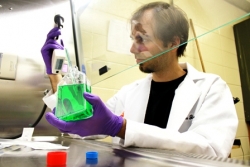Research Spotlight: Algae Genetics
Algae naturally produce large amounts of lipids relative to their cell mass, as much as 50% in some species, and therefore have been named a target organism for use in biofuel production. These lipids can ultimately be extracted and converted into biodiesel. One of the focuses in CRAFT's algae research is the identification and regulation of the genes involved in algal lipid production in an effort to maximize the amount of oil for the creation of biofuel.
Dr. Rebekah Waikel of Eastern Kentucky University's Department of Biology and Research Assistant Joshua Jones have been focusing on sequencing four specific algae genes from two species of algae known for high levels of lipid production. Once these genes are identified they can then be amplified and manipulated to promote an increase in lipid production. "At this moment, we are still attempting to isolate and sequence the four genes using known sequences in other algal organisms as a reference. The experiments are resulting in promising fragments of DNA that could yield the sequence of the genes in the two target algae," says Joshua Jones.
The enzymes produced by three of the genes of interest are directly involved with the production of algal lipids. The fourth gene of interest produces an enzyme that promotes starch storage. When algae are storing starch they produce little to no lipid. Therefore a maximal lipid producing algae would have high expression levels of the three genes involved in lipid production and decreased expression levels of the gene involved in starch storage.
"The importance of our research is to understand the expression of genes that are involved with lipid production so that we can decide the best ways to alter that expression and control the production of algal oil to our benefit" says Jones.
Contact Information
Brad Barnett
brad.barnett@eku.edu
622-7316
Published on August 25, 2011
